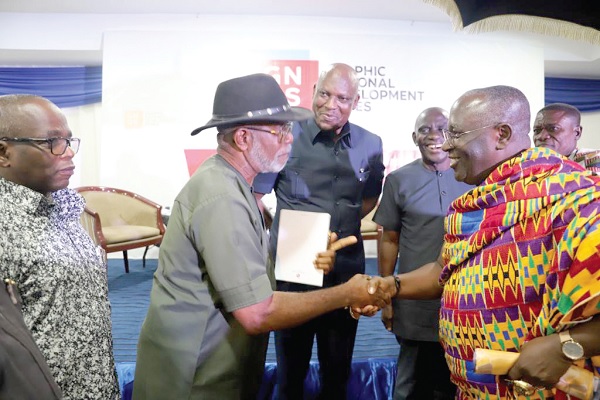
Graphic National Dialogue Series - Participants proffer food security solutions
Participants in the maiden edition of the Graphic National Development Series (GNDS) have called for a new way of doing things in order to turn around the agricultural sector to ensure food sufficiency.
The GNDS
The GNDS, which was organised by the Graphic Communications Group Ltd in collaboration with the Ghana Broadcasting Corporation, under the distinguish patronage of the Asantehene Otumfuo Osei Tutu II, was on the theme "Transforming Ghana's Agriculture using home-grown solutions for food security."
The programme was attended by technocrats, experts and members of civil society in the agricultural value chain and academia.
The Chief of Asafo and Akwamuhene of the Kumasi Traditional Council, Acheamfour Asafo Boakye Agyeman-Bonsu, who represented the Asantehene, Osei Tutu II, added colour to the event.
The participants, who touched on various issues on agriculture and food systems in the country, believed that a radical shift in agriculture would help revolutionise agriculture to ensure food security in the country.
Concerns
They advocated that such a revolution should begin with the kind of education given to schoolchildren to generate interest in it, expressing concerns that the situation where schoolchildren were made to weed as punishment discouraged them from the area.
The participants further expressed concern that the current method of farming was not sustainable, especially when farmers relied heavily on rain-fed agriculture and advocated for the need-escalated irrigation to ensure all-year-round farming.
They also raised concerns about the high cost of inorganic fertiliser since the conflict between Russia and Ukraine broke out, leading to a shortage of the commodity, and therefore, called for the promotion of organic fertiliser, which they believed was the best alternative for the farmers.
Smart agriculture
Leading a panel discussion, the Founder of the Songhai Centre in the Republic of Benin, Fr Professor Godfrey Nzamujo, called for agro-ecological and smart agricultural practices to turn Ghana's food and agriculture system to become resilient, regenerative, highly productive and sustainable.
Fr Prof. Nzamujo expressed concern that the challenge confronting African countries was "our inability to narrate our own story” and called for a renewed mind to "revolutionise our economies".
He called for an integrated ecological system that organically created dynamic linkages and synergies between agriculture, industries and services together.
Using the Songhai technology, Fr Prof. Nzamujo believed Ghana, and for that matter, Africa, had what it took to be food sufficient, stressing that the important thing was that "we need to believe in ourselves."
Agric education
For his part, an Agricultural Consultant for the J.A. Kufour Foundation, Abraham Dwuma Odoom, called for a relook at the educational curriculum in schools from basic to tertiary, where students would be encouraged to go into agriculture, and expressed concern that currently, agriculture as a subject was not taught in basic schools until the secondary level.
He said the worst thing was that at school, weeding was used as a way of punishment, making agriculture unattractive to students.
A Specialist Consultant in international agriculture and rural development, Dr Michael Abu Sakara Foster, said the major problem in the country involving agriculture was the implementation of policy and management decision.
He said the real stumbling block to policy implementation was about the reallocation of resources in such a way that they would "generate what will make our lives better".
In a closing remark, Acheamfour Agyeman-Bonsu added his voice to the need to relook at the country's educational system, calling for an agricultural revolution that transformed the country's economy.
He called for an agricultural revolution group to be made up of traditional leaders, the private and the public sector and the government to champion the transformation of the economy.
“We should be able to put up an agricultural transformation group made up of traditional leaders, the private sector, as well as the government and the research community (academia) to support the scheme,” he said.
